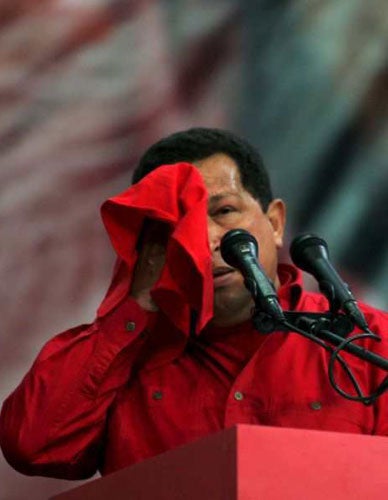Tough-talking Chavez faces rising dissent
Venezuelan President's popularity hit by power cuts and soaring crime rate

Your support helps us to tell the story
From reproductive rights to climate change to Big Tech, The Independent is on the ground when the story is developing. Whether it's investigating the financials of Elon Musk's pro-Trump PAC or producing our latest documentary, 'The A Word', which shines a light on the American women fighting for reproductive rights, we know how important it is to parse out the facts from the messaging.
At such a critical moment in US history, we need reporters on the ground. Your donation allows us to keep sending journalists to speak to both sides of the story.
The Independent is trusted by Americans across the entire political spectrum. And unlike many other quality news outlets, we choose not to lock Americans out of our reporting and analysis with paywalls. We believe quality journalism should be available to everyone, paid for by those who can afford it.
Your support makes all the difference.It is early evening and virtually the only light comes from the burning tyres placed across the main road, opposite the offices of the state electricity company. "We've had it with these people," says one protester. "This is the third power-cut in a week."
This particular demonstration took place in the north-western state of Falcón, but it is typical of the situation across Venezuela. The country is preparing for local and regional elections on Sunday amid rising social tensions and a deteriorating economic situation which bode ill for the leftist President, Hugo Chavez, and his "Bolivarian revolution". At stake are 22 out of 23 state governments, more than 300 municipalities and control of the capital, Caracas.
With just four states in opposition hands, Mr Chavez has nowhere to go but down. Polls suggest opposition parties – which have forged unity candidacies in most constituencies – will increase their control of the regions, including the strategically important and populous state of Carabobo.
But despite the blackouts, high inflation, food shortages and an unprecedented crime wave, political analysts warn that – even with oil, the main export, falling below US$50 (£33) a barrel – it is far too soon to count the wily former army officer out. He has warned that he will shut down any television stations that broadcast early election results, and is threatening to jail a popular opposition leader, Manuel Rosales. "That criminal must go to prison," Mr Chavez said, referring to corruption allegations against his rival.
Even more ominously, Mr Chavez has spoken of a violent reaction to opposition gains at the polls. "This is an armed revolution and the people are willing to defend the revolutionary process," he said this week.
The outlook for the President is further complicated by dissident forces within his own movement, which will split his vote in many states. They could even wrest control of Barinas, his home state, from his family, which is accused of growing wealthy from the public purse.
Corruption, however, while rampant, is not among the most pressing concerns of the electorate. "The number of street protests has grown exponentially in the last few months," says Carlos Correa, who heads the civil rights group Public Space. A recent report found most demonstrations were over "community welfare, rather than political grievances". Top of the list were labour rights, crime and housing.
Support for the President himself remains high, at about 58 per cent according to one recent poll, and Mr Chavez has sought to turn the local elections into a plebiscite on his rule.
But inflation will top 30 per cent this year, and Venezuela is also one of the world's most violent countries, with a murder rate that has more than tripled under Mr Chavez. Although the government runs a massive programme of food imports and subsidies on basic goods, many disappear from the shelves for weeks or months at a time. Since the government bought out private electricity companies last year, blackouts have become commonplace.
But the opposition may not find it easy to capitalise on discontent. Jesus Torrealba, a campaigner for slum-dwellers' rights, cautions that isolated protests can simply lead to frustration. "Next year, we'll have a government with less cash," Mr Torrealba warns. "But its determination will be undiminished."
58%
President Chavez's approval rating.
Join our commenting forum
Join thought-provoking conversations, follow other Independent readers and see their replies
Comments